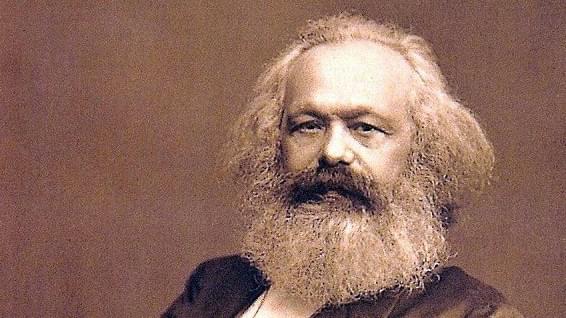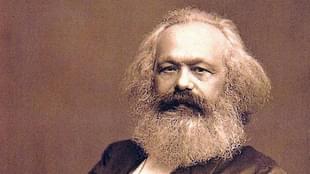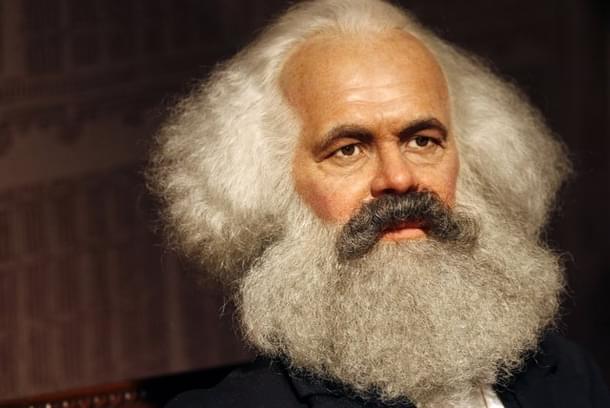Elsewhere
Eight Facts Communists Hide About Marx
Swarajya Staff
Nov 06, 2017, 08:01 PM | Updated 08:01 PM IST
Save & read from anywhere!
Bookmark stories for easy access on any device or the Swarajya app.


Groucho was certainly the more entertaining Marx, and possibly made more sense. Here are 8 facts you should know about the man who undeniably made a great dent in human history.
1. Karl Marx was a poet, and a pretty scary one
As a young man, Marx wrote quite a bit of poetry. However, only about 40 poems have survived. Many of them are marked by violence, a sense of doom, a cursed universe, and pacts with the Devil. Sample this extract from his verse tragedy Oulanen:
Let the envenomed eye flash forth destruction-
Does it hurl off the ponderous worlds that bind?
Bound in eternal fear, splintered and void,
Bound to the very marble block of Being,
Bound, bound forever, and forever bound!
The worlds, they see it and go rolling on
And howl the burial song of their own death.
Does this man need therapy?
2. He played the stockmarkets
He wrote his uncle (husband of Marx’s mother’s sister), Dutch businessman Lion Philips, in a letter dated 25 June1864: “I have, which will surprise you not a little, been speculating partly in American funds, but more especially in English stocks, which are springing up like mushrooms this year (in furtherance of every imaginable and unimaginable joint stock enterprise) are forced up to a quite unreasonable level and then, for most part, collapse. In this way, I have made over £400. Now that the complexity of the political situation affords greater scope, I shall begin all over again.”

3. His first cousin founded electronics giant Philips
Lion Philips’ (see above) son Frederick was a banker and set up the Philips Company in 1891 with his son Gerard Philips as a family business. Gerard and his younger brother Anton changed the business to a corporation, Royal Philips Electronics NV in 1912, which has grown to be today’s giant multinational. Marx regularly borrowed money from Lion till Lion lost patience and cut him off.
4. Many of his most famous lines are not his at all
It was Jean-Paul Marat, a leader of the French Revolution who wrote: “The proletarians have nothing to lose but their chains.” German labour leader Karl Schapper first said: “Workers of the world, unite!” And it was French socialist Louis Auguste Blanqui who first called for “a dictatorship of the proletariat”. Marx borrowed all these pithy lines to embellish his arguments in his writings.
5. He falsified data systematically to prove his points
In 1885, two Cambridge scholars, Joseph Robson Tanner and F.S. Carey published a monograph titled Comments on the Use of the Blue Books Made by Karl Marx in Chapter XV of Le Capital, in which they exposed how Marx had misquoted, misrepresented and falsified data and information published in British government reports (the Blue Books) to make his points, while citing them as his sources. And, mind you, it’s just one chapter that they studied.
They wrote: “He uses the Blue Books with a recklessness which is appalling…to prove just the contrary of what they really establish.” They went on to say that their evidence certainly showed “an almost criminal recklessness in the use of authorities” and warranted treating any “other parts of Marx’s works with suspicion”.

6. Marx was anti-Semitic
Though born a Jew, Marx developed very strong views about Judaism. “What was the profane basis of Judaism?” he wrote. “Practical need. Self-interest. What is the worldly cult of the Jew? Huckstering. What is his worldly God? Money.” He believed that the Jews, with their “money greed”, had corrupted Christians and convinced them that “the world is a stock exchange.”
7. He had extremely poor personal hygiene
A Prussian policeman investigating Marx in London in 1850 reported on his room: “Everything dirty and covered with dust, so that to sit down becomes a hazardous business.” Other accounts by contemporaries talk about the fact that Marx hardly ever took baths or washed much at all. This was the cause for “a veritable plague of boils” that he suffered from for decades. These boils irritated him so much that he wrote to Engels: “Whatever happens, I hope the bourgeoisie, as long as they exist, will have cause to remember my carbuncles.”
8. He was Britain’s greater exploiter of a worker
Even Marx admitted that though his research found large-scale exploitation of workers in Britain, he never discovered a worker who was paid literally no wages at all. He need not have looked far for this. Helen Demuth lived with the Marx family as domestic help from 1845 until her death in 1890. She got her keep but was never paid anything. Marx slept with her and in 1851, even fathered a son, registered as Henry Frederick Demuth. Marx denied that he was the father and refused to accept any responsibility.
The boy was brought up in a foster home, and Marx refused to ever see him, insisting that if Freddy had to meet his mother, he had to enter through the back door, and meet her only in the kitchen. However, Engels, after Marx had died, acknowledged that Marx was Freddy’s father, as did Marx’s daughter Eleanor. Freddy worked as a railway engineer and died in 1929.





